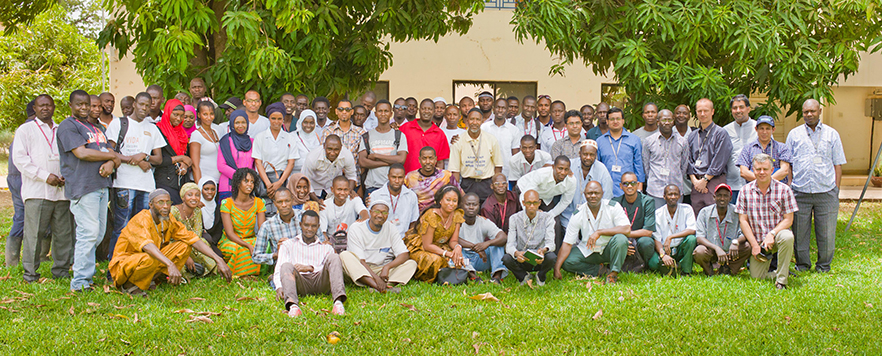
The research team in The Gambia
Study examines the real-life long-term impact of routine introduction of vaccine
Introduction of the pneumococcal conjugate vaccines (PCV) to childhood routine vaccination in The Gambia reduced severe infections associated with pneumococcal disease, according to new research published in The Lancet Infectious Diseases, the world's leading infectious diseases journal.
Pneumococcal disease is caused by Streptococcus pneumoniae, the leading bacterial cause of pneumonia across the world, leading to approximately half a million deaths in children every year. PCV are being rolled out globally, but because they don't cover all the strains (serotypes) of Streptococcus pneumoniae, rollout requires careful surveillance to be certain that there is an overall benefit from the vaccines.
The Pneumococcal Surveillance Project (PSP) showed that, among children under 5 years of age, the use of PCV in The Gambia reduced incidence of pneumococcal pneumonia, sepsis and meningitis in children by 80 per cent. The introduction of the vaccine was also found to reduce very severe pneumonia by 60 per cent. Remarkably, there were zero cases of vaccine-type invasive pneumococcal disease detected in the 2-11 month age group in 2016 and 2017.
The study also found the incidence of radiological pneumonia decreased by 33 per cent in the 2-29 month olds, while pneumonia hospitalisations declined by 27 per cent. In older children, aged 5-14 years, invasive pneumococcal disease cases declined by 69 per cent and radiological pneumonia by 27 per cent.
This large project was set up in 2008 to determine the impact of the introduction of PCV in the Gambian EPI program on pneumonia, sepsis, and meningitis in The Gambia. The surveillance was conducted over a 10-year period in Basse, rural eastern Gambia. A population of 200,000 people was monitored and over 26,000 individuals were assessed at health facilities.
This study shows the real-life impact of the routine introduction of PCV in a low-income country and that some of the benefits take many years to take full effect. Dr Grant Mackenzie, from the Medical Research Council (MRC) Unit The Gambia at the London School of Hygiene & Tropical Medicine (LSHTM) and who led this research, said: “The PSP results should reassure EPI programmes in low-income countries that spending money on PCV, and delivering the vaccine with reasonable coverage, will substantially reduce rates of disease and save lives.”

Professor Philip Hill
McAuley Professor of International Health at the University of Otago, and one of the leaders of the study, Philip Hill, said that the quality of the project is a testimony to the dedication of a large team of field and laboratory researchers over more than a decade.
“Having worked at the MRC unit in The Gambia before returning to New Zealand, and visiting them regularly since to help with the study, it is really pleasing to see how this surveillance project has been able to produce reliable data that the rest of the world can benefit so much from.”
Reducing the rate of pneumococcal disease will not only save lives but also reduce the substantial economic burden it has on families and health systems. The researchers hope these findings will bolster confidence in countries that have introduced PCV into their EPI programs and encourage countries that have not yet adopted these life-saving vaccines to do so.
The study was carried out in collaboration between the MRC Unit The Gambia at the London School of Hygiene & Tropical Medicine (LSHTM), the Ministry of Health in The Gambia, the Medical Research Council (MRC), the University of Otago, the International Vaccine Access Centre at Johns Hopkins University, the Murdoch Children's Research Institute in Melbourne, and the Program for Appropriate Technology in Health in Seattle. It was funded by the Global Alliance for Vaccines (Gavi), the Immunisation's Pneumococcal Vaccines Accelerated Development and Introduction Programme, the Bill & Melinda Gates Foundation, Pfizer Ltd. and the MRC.
Publication details:
Impact of the introduction of pneumococcal conjugate vaccination on invasive pneumococcal disease and pneumonia in The Gambia: 10 years of population-based surveillance
The Lancet Infectious Diseases
Find an Otago expert
Use our Media Expertise Database to find an Otago researcher for media comment.